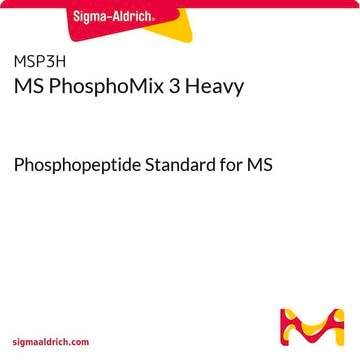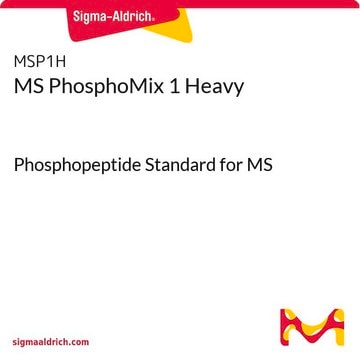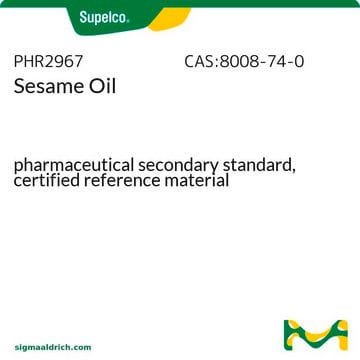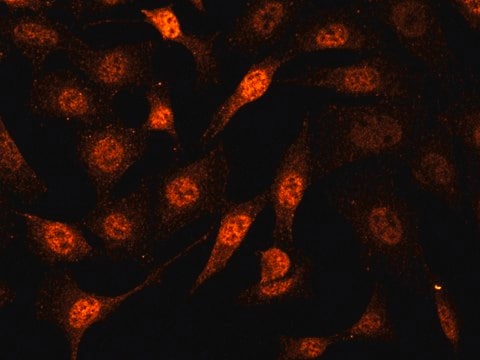The optimal protein concentration needed for the assay is sample dependent and should be empirically determined via titration/dilution of the protein sample. For use of Suc-LLVY-AMC substrate on heart samples, one may consider homogenizing using 10 volumes of HEPES buffer (50 mmol/L) containing 20 mmol/L KCl, 5 mmol/L MgCl2, 1 mmol/L DTT, pH 7.5, followed up with centrifugation at 10,000×g for 30 min. at 4 °C. Under this condition, 30 ug protein per assay seems to work well as described by the following publication that may be of interest for reference:
推薦產品
一般說明
Introduction:
The ubiquitin-proteasome pathway is the major proteolytic system in the cytosol of eukaryotic cells, where it catalyzes the selective degradation of short-lived regulatory proteins and the rapid elimination of proteins with abnormal conformation (Hershko & Ciechanover 1998; Hochstrasser 1996). The critical protease in this pathway is the 26S proteasome, an ATP-dependent proteolytic complex, which is formed by the association of the barrel-shaped 20S proteasome (700-kDa) and two 19S (700-kDa) regulatory complexes (Baumeister et al. 1998; Coux et al. 1996). The 20S Proteasome, catalytic core of the proteasome complex, is responsible for the breakdown of key proteins involved with apoptosis, DNA repair, endocytosis, and cell cycle control (Coux et al. 1996; Hoffman & Rechsteiner 1996; Hochstrasser 1995). The CHEMICON® Proteasome Activity Assay Kit provides a quick, efficient and sensitive system for evaluation of proteasome activity in cell lysates or inhibitor screening.
Test Principle:
Chemicon′s Proteasome Activity Assay Kit provides a simple and convenient means for assaying proteasome activity that recognize the substrate LLVY (Meng et al. 1999). The assay is based on detection of the fluorophore 7-Amino-4-methylcoumarin (AMC) after cleavage from the labeled substrate LLVY-AMC. Absorption=351nm. Emission=430nm. The free AMC fluorescence can be quantified using a 380/460 nm filter set in a fluorometer.
A proteasome inhibitor, Lactacystin, is included as a test inhibitor for screening purpose. Lactacystin is a microbial natural product and the most specific and potent inhibitor of proteasomes currently known (Fenteany & Schreiber 1998).
Application:
The Proteasome Activity Assay Kit is a relatively quick method for detection of intracellular proteasome activity. Testing of purified proteasome enzyme, in vitro inhibitor screening and the study of proteasome regulation can be performed with this assay.
The CHEMICON Proteasome Activity Assay Kit is intended for research use only, not for diagnostic or therapeutic applications.
The ubiquitin-proteasome pathway is the major proteolytic system in the cytosol of eukaryotic cells, where it catalyzes the selective degradation of short-lived regulatory proteins and the rapid elimination of proteins with abnormal conformation (Hershko & Ciechanover 1998; Hochstrasser 1996). The critical protease in this pathway is the 26S proteasome, an ATP-dependent proteolytic complex, which is formed by the association of the barrel-shaped 20S proteasome (700-kDa) and two 19S (700-kDa) regulatory complexes (Baumeister et al. 1998; Coux et al. 1996). The 20S Proteasome, catalytic core of the proteasome complex, is responsible for the breakdown of key proteins involved with apoptosis, DNA repair, endocytosis, and cell cycle control (Coux et al. 1996; Hoffman & Rechsteiner 1996; Hochstrasser 1995). The CHEMICON® Proteasome Activity Assay Kit provides a quick, efficient and sensitive system for evaluation of proteasome activity in cell lysates or inhibitor screening.
Test Principle:
Chemicon′s Proteasome Activity Assay Kit provides a simple and convenient means for assaying proteasome activity that recognize the substrate LLVY (Meng et al. 1999). The assay is based on detection of the fluorophore 7-Amino-4-methylcoumarin (AMC) after cleavage from the labeled substrate LLVY-AMC. Absorption=351nm. Emission=430nm. The free AMC fluorescence can be quantified using a 380/460 nm filter set in a fluorometer.
A proteasome inhibitor, Lactacystin, is included as a test inhibitor for screening purpose. Lactacystin is a microbial natural product and the most specific and potent inhibitor of proteasomes currently known (Fenteany & Schreiber 1998).
Application:
The Proteasome Activity Assay Kit is a relatively quick method for detection of intracellular proteasome activity. Testing of purified proteasome enzyme, in vitro inhibitor screening and the study of proteasome regulation can be performed with this assay.
The CHEMICON Proteasome Activity Assay Kit is intended for research use only, not for diagnostic or therapeutic applications.
應用
Lysis buffer: 50 mM HEPES (pH 7.5), 5 mM EDTA, 150 mM NaCl and 1% Triton X-100. Addition of 2 mM ATP to the lysate will improve the recovery of intact 26S proteasome.
Also see: Hoffman, L. 1992 at http://www.jbc.org/cgi/reprint/267/31/22362.pdf
Also see: Hoffman, L. 1992 at http://www.jbc.org/cgi/reprint/267/31/22362.pdf
The Proteasome Activity Assay Kit provides a simple & convenient means for assaying proteasome activity that recognize the substrate LLVY.
其他說明
Unless otherwise stated in our catalog or other company documentation accompanying the product(s), our products are intended for research use only and are not to be used for any other purpose, which includes but is not limited to, unauthorized commercial
法律資訊
CHEMICON is a registered trademark of Merck KGaA, Darmstadt, Germany
儲存類別代碼
10 - Combustible liquids
分析證明 (COA)
輸入產品批次/批號來搜索 分析證明 (COA)。在產品’s標籤上找到批次和批號,寫有 ‘Lot’或‘Batch’.。
-
Could you please provide clarification on the protocol for the 20S Proteasome activity assay (APT280)? The protocol does not specify the protein concentration or the buffer for diluting the sample. Additionally, I need guidance on homogenizing and diluting heart samples for the assay. What buffer should I use for homogenization and dilution?
1 answer-
Helpful?
-
Active Filters
我們的科學家團隊在所有研究領域都有豐富的經驗,包括生命科學、材料科學、化學合成、色譜、分析等.
聯絡技術服務








